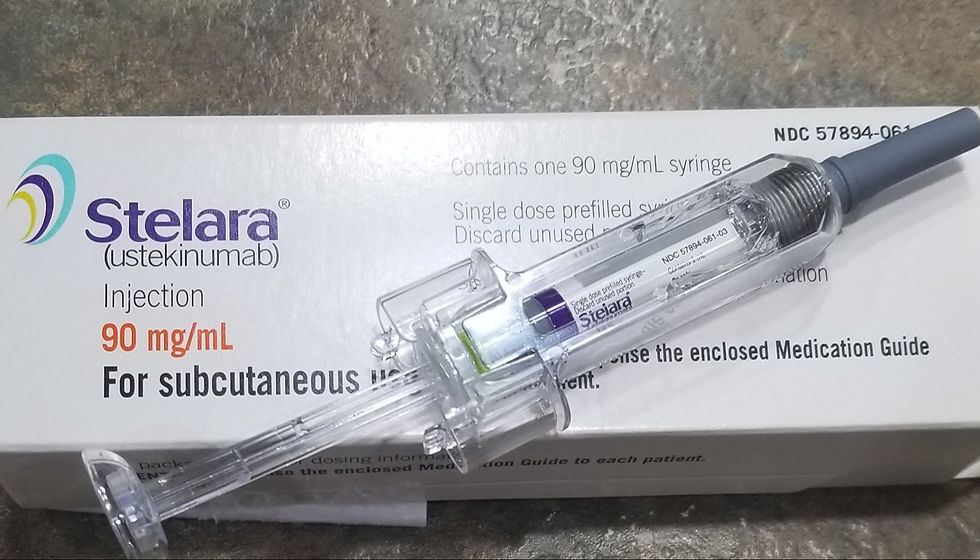Biological Treatments for Crohn's Disease: Past and Present
- Crohn Zone

- May 17, 2024
- 4 min read
Updated: Jul 3, 2024
Biologic therapies have transformed the treatment landscape for Crohn's disease, offering targeted and effective solutions for managing this chronic inflammatory bowel disease (IBD). These treatments work by targeting specific components of the immune system to reduce inflammation and maintain remission. In this article, we will explore the evolution of biologic treatments, from older therapies like Remicade to the latest advancements from 2022 to 2024.

Understanding Biologic Biological treatments for Crohn's disease
Biologics are medications derived from living organisms. They are designed to target specific molecules involved in the immune response, providing a more precise approach to treating inflammatory diseases like Crohn's. Unlike traditional treatments, which broadly suppress the immune system, biologics focus on specific pathways, reducing the risk of widespread side effects.
The Pioneers: Older Biological treatments for Crohn's disease
Remicade (Infliximab) - Janssen Biotech, Inc
Remicade, also known as infliximab, was one of the first biologic therapies approved for Crohn's disease. Introduced in the late 1990s, it is a monoclonal antibody that targets tumor necrosis factor-alpha (TNF-alpha), a protein involved in inflammation. Remicade has been highly effective in reducing symptoms and inducing remission in many patients. It is administered via intravenous infusion and has become a cornerstone of Crohn's disease treatment.
Humira (Adalimumab) - AbbVie Inc.
Humira, or adalimumab, is another anti-TNF biologic that followed Remicade. Approved in the early 2000s, Humira is administered through subcutaneous injections, offering a more convenient option for patients. Like Remicade, it targets TNF-alpha and has shown significant effectiveness in managing Crohn's disease symptoms and maintaining remission.
Cimzia (Certolizumab Pegol) - UCB, Inc.
Cimzia, or certolizumab pegol, is a PEGylated anti-TNF biologic approved in the late 2000s. Its unique structure allows for a longer half-life, meaning it stays in the body longer and requires less frequent dosing. Cimzia is administered via subcutaneous injection and has been effective in treating moderate to severe Crohn's disease.
Simponi (Golimumab) - Janssen Biotech, Inc.
Simponi, or golimumab, is another anti-TNF biologic approved for ulcerative colitis and used off-label for Crohn's disease. It is administered via subcutaneous injection and provides another option for patients who may not respond to or tolerate other anti-TNF therapies.
New Wave: Recent Biologic Treatments (2022-2024)
Stelara (Ustekinumab) - Janssen Biotech, Inc.
Stelara, or ustekinumab, is a newer biologic that targets interleukin-12 (IL-12) and interleukin-23 (IL-23), proteins involved in the inflammatory process. Approved for Crohn's disease in recent years, Stelara is administered initially by intravenous infusion, followed by subcutaneous injections. It has been highly effective in patients who do not respond to anti-TNF therapies, offering a new option for those with refractory disease.
Entyvio (Vedolizumab) - Takeda Pharmaceuticals
Entyvio, or vedolizumab, is a biologic that targets the integrin alpha-4 beta-7, which is involved in the migration of white blood cells to the gut. Approved for Crohn's disease and ulcerative colitis, Entyvio is administered via intravenous infusion. It offers a gut-specific approach, reducing inflammation in the intestines with fewer systemic effects.
Rinvoq (Upadacitinib) - AbbVie Inc.
Rinvoq, or upadacitinib, is a Janus kinase (JAK) inhibitor that has shown promise in recent clinical trials for Crohn's disease. Although not a traditional biologic, it targets specific enzymes involved in the immune response, offering a novel mechanism of action. Rinvoq is administered orally, providing a convenient alternative to injectable biologics.
Skyrizi (Risankizumab) - AbbVie Inc.
Skyrizi, or risankizumab, is a newer IL-23 inhibitor approved for Crohn's disease in 2023. It is administered by subcutaneous injection and has shown excellent results in reducing symptoms and maintaining remission. Skyrizi represents the latest advancement in targeting specific pathways involved in the inflammatory process.
Zeposia (Ozanimod) - Bristol Myers Squibb
Zeposia, or ozanimod, is an oral sphingosine-1-phosphate (S1P) receptor modulator recently approved for ulcerative colitis and currently being studied for Crohn's disease. It modulates the immune response by preventing lymphocytes from leaving lymph nodes, thereby reducing inflammation in the gut.
Omvoh (Mirikizumab) - Eli Lilly and Company
Omvoh, or mirikizumab, is a novel IL-23 inhibitor recently approved for Crohn's disease. Administered via subcutaneous injection, Omvoh has shown promising results in clinical trials by effectively reducing inflammation and maintaining remission. Its approval adds another valuable option for patients with Crohn's disease, particularly those who have not responded to other treatments.
The Future of Biologic Treatments
The development of biologic therapies for Crohn's disease continues to advance, with ongoing research focusing on improving efficacy, safety, and patient convenience. Future treatments may include new targets within the immune system, personalized medicine approaches based on genetic profiles, and innovative delivery methods to enhance patient adherence and outcomes.
Conclusion
Biologic therapies have revolutionized the treatment of Crohn's disease, providing targeted and effective options for managing this challenging condition. From the pioneering treatments like Remicade to the latest advancements such as Omvoh and Skyrizi, these therapies offer hope and improved quality of life for patients. Staying informed about the latest developments and working closely with healthcare providers can help patients find the best treatment plan for their individual needs.
For more information on biologic treatments and the latest advancements in Crohn's disease care, continue to follow Crohn Zone, your trusted source for comprehensive and up-to-date information.
Disclaimer: The information provided in this article is for educational purposes only and should not be considered medical advice. Always consult with your doctor or a qualified healthcare provider before starting any new treatment or making any changes to your existing treatment plan.
.png)













Comments